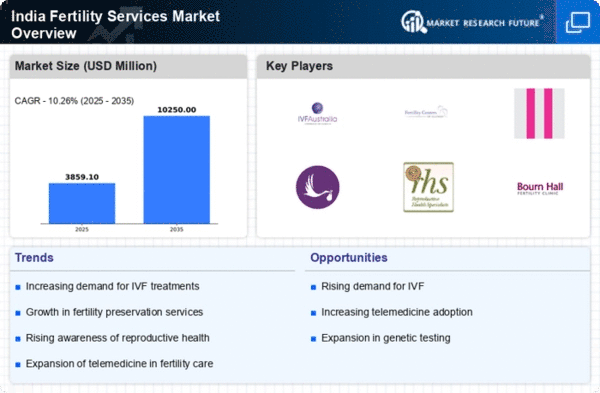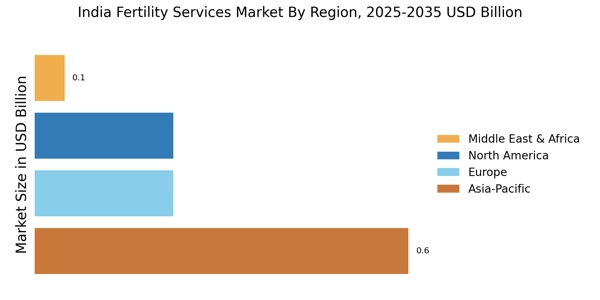Rising Infertility Rates
The increasing prevalence of infertility in India appears to be a primary driver for the India Fertility Services Market. Recent statistics indicate that approximately 10 to 15% of couples in India experience infertility issues, which translates to millions of individuals seeking assistance. Factors contributing to this rise include lifestyle changes, delayed marriages, and environmental influences. As awareness about fertility treatments grows, more couples are likely to explore options such as in vitro fertilization (IVF) and other assisted reproductive technologies. This trend suggests a robust demand for fertility services, thereby propelling the growth of the industry.
Technological Innovations
Technological advancements in reproductive medicine are significantly influencing the India Fertility Services Market. Innovations such as preimplantation genetic testing, cryopreservation techniques, and improved IVF protocols have enhanced success rates for fertility treatments. The introduction of artificial intelligence in patient management and treatment personalization is also gaining traction. As these technologies become more accessible, they are likely to attract a broader demographic seeking fertility solutions. The integration of advanced technologies not only improves treatment outcomes but also fosters patient confidence, which could lead to increased market penetration.
Increased Awareness and Education
The rising awareness and education surrounding fertility issues and treatments are crucial drivers for the India Fertility Services Market. Educational campaigns and outreach programs are helping to demystify infertility and the available solutions. As more individuals become informed about their reproductive health, they are more likely to seek assistance when facing challenges. This heightened awareness is also fostering a more supportive environment for those experiencing infertility, which could lead to increased utilization of fertility services. Consequently, the market is poised for growth as more couples recognize the options available to them.
Government Initiatives and Support
Government initiatives aimed at promoting reproductive health and family planning are likely to bolster the India Fertility Services Market. Various state and national programs are being implemented to raise awareness about infertility and available treatments. Financial assistance schemes and subsidies for fertility treatments are also being introduced, making services more affordable for a larger segment of the population. This proactive approach by the government may encourage couples to seek help sooner, thereby increasing the overall demand for fertility services in the country.
Cultural Shifts Towards Family Planning
Cultural shifts in India regarding family planning and reproductive health are emerging as a significant driver for the India Fertility Services Market. As societal norms evolve, there is a growing acceptance of assisted reproductive technologies among younger generations. Couples are increasingly prioritizing their careers and personal goals before starting families, leading to a rise in delayed parenthood. This trend is likely to result in a higher demand for fertility services as couples seek to conceive later in life. The changing perception of fertility treatments is expected to further normalize their use, contributing to market growth.

















